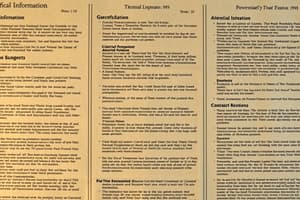Podcast
Questions and Answers
There are some forms of classified information, such as classified waste, that do not have to be protected.
There are some forms of classified information, such as classified waste, that do not have to be protected.
False (B)
The higher the level of classification, the more protection the classified information requires to reasonably prevent the possibility of its loss or compromise.
The higher the level of classification, the more protection the classified information requires to reasonably prevent the possibility of its loss or compromise.
True (A)
Classified information may be disclosed to authorized persons in cleared facilities of a Multiple Facility Organization (MFO).
Classified information may be disclosed to authorized persons in cleared facilities of a Multiple Facility Organization (MFO).
True (A)
When can classified information be disclosed to the public?
When can classified information be disclosed to the public?
What is the purpose of an IMS?
What is the purpose of an IMS?
As long as the package remains sealed, the company can designate any employee to pick up and sign for packages at their designated P.O. Box as long as he or she brings it directly back to the office and does not open it.
As long as the package remains sealed, the company can designate any employee to pick up and sign for packages at their designated P.O. Box as long as he or she brings it directly back to the office and does not open it.
When a shipment is received via a cleared commercial carrier, the sender must notify the recipient in advance when the shipment is to be expected.
When a shipment is received via a cleared commercial carrier, the sender must notify the recipient in advance when the shipment is to be expected.
Working papers must be dated when _______________
Working papers must be dated when _______________
In order to continue to be used to protect classified information, an approved security container that has been repaired must _________________________
In order to continue to be used to protect classified information, an approved security container that has been repaired must _________________________
What are the two labels that all GSA-approved storage containers must have affixed to them?
What are the two labels that all GSA-approved storage containers must have affixed to them?
Classified information may only be stored in GSA-approved storage containers.
Classified information may only be stored in GSA-approved storage containers.
How often should key-operated padlocks be changed or rotated on security containers?
How often should key-operated padlocks be changed or rotated on security containers?
Which of the following is not a good way to protect combinations?
Which of the following is not a good way to protect combinations?
You can call the DoD Lock Program hotline to obtain free magnetic Secured and Open signs to attach to the sides of your security containers.
You can call the DoD Lock Program hotline to obtain free magnetic Secured and Open signs to attach to the sides of your security containers.
__________________ information stored in a GSA-approved security container or vault requires supplemental protection.
__________________ information stored in a GSA-approved security container or vault requires supplemental protection.
When are end of day security checks required?
When are end of day security checks required?
Which report should be sent to your Defense Security Service (DSS) Field Office if your facility had an emergency evacuation and you were unable to secure the classified information you were using before you had to leave?
Which report should be sent to your Defense Security Service (DSS) Field Office if your facility had an emergency evacuation and you were unable to secure the classified information you were using before you had to leave?
What statement applies to perimeter control inspections?
What statement applies to perimeter control inspections?
What is the purpose of perimeter controls?
What is the purpose of perimeter controls?
When outside of its security container, classified information must be kept ______________________.
When outside of its security container, classified information must be kept ______________________.
What is the purpose of restricted areas?
What is the purpose of restricted areas?
It is a good security practice to prohibit use of all__________________ in areas containing classified material as they can record and transmit classified information orally and photographically.
It is a good security practice to prohibit use of all__________________ in areas containing classified material as they can record and transmit classified information orally and photographically.
Top Secret reproduction never requires Government Contracting Activity (GCA) authorization.
Top Secret reproduction never requires Government Contracting Activity (GCA) authorization.
Copy machines or reproduction equipment with memory must __________________________.
Copy machines or reproduction equipment with memory must __________________________.
Which of the following is not a security best practice when reproducing classified information?
Which of the following is not a security best practice when reproducing classified information?
When requesting retention authority from the Government Contracting Activity (GCA), you must identify the classified information for which you are requesting retention as well as provide a statement of justification.
When requesting retention authority from the Government Contracting Activity (GCA), you must identify the classified information for which you are requesting retention as well as provide a statement of justification.
Flashcards are hidden until you start studying
Study Notes
Classified Information Protection
- Classified waste does not require protection.
- Classification Levels: Higher classification levels necessitate increased protection to prevent loss or compromise.
- Authorized Disclosure: Classified information can be shared with authorized personnel in cleared facilities within a Multiple Facility Organization (MFO).
- Public Disclosure: Classified information cannot be disclosed to the public at any time.
Information Management System (IMS)
- The IMS facilitates timely retrieval and disposition of classified information.
Package Handling
- Receiving Packages: Only authorized personnel may pick up sealed packages; random employee designation is not permitted.
- Notification Requirement: Senders must notify recipients of expected shipments via cleared commercial carriers.
Documentation and Storage
- Working Papers must be dated upon creation.
- Approved security containers must be restored to their original state after repairs to maintain protection integrity.
- Labels for Storage Containers: All GSA-approved containers require a GSA Test Certification label and a GSA Approved Security Container label.
- Classified information may be stored in other than GSA-approved containers.
Security Procedures
- Key-Operated Padlocks: These should be changed or rotated at least annually.
- Combination Protection: Writing combinations down and storing them in a locked desk drawer is not a secure practice.
- End of Day Checks: Security checks are mandatory at the end of each last working shift.
Emergency Procedures
- In the event of an emergency evacuation without securing classified information, report the Inability to Safeguard Classified Material to the Defense Security Service (DSS) Field Office.
Perimeter Control
- Perimeter Inspections: Must be consistently applied to ensure security.
- Purpose of Perimeter Controls: To deter and detect unauthorized removal or introduction of classified information.
Handling Classified Information
- When outside its secure container, classified information must be under constant surveillance by an authorized individual.
- Restricted areas control access to classified information in open areas during working hours.
- Use of Wireless Devices is prohibited within areas containing classified material due to their capability to record and transmit sensitive information.
Reproduction of Classified Information
- Top Secret Reproduction: Always requires Government Contracting Activity (GCA) authorization.
- Reproduction equipment with memory must be authorized in accordance with NISPOM Chapter 8.
- Best practices for reproducing classified information do not include using equipment closest to the storage security container.
Retention Authority
- When requesting retention authority from the GCA, clearly identify the classified information and provide a justification statement.
Studying That Suits You
Use AI to generate personalized quizzes and flashcards to suit your learning preferences.




